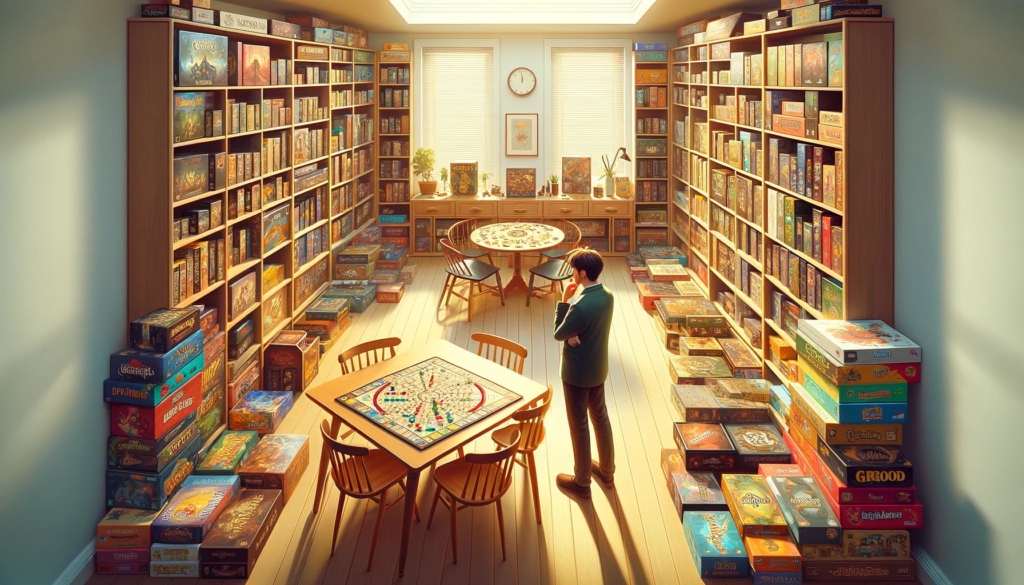People feel life is meaningless when they don’t have goals, rules, and feedback. (These are the 3 attributes of games, according to Dr Jason Fox, that I describe in-depth in my short ebook Gamify Your Work.)
Playing the game of life, and doing work that supports your lifestyle, is only made meaningful if we have goals to achieve, rules for how to play, and feedback on how we are doing.

image prompt: someone with lots of games deciding what to play
We often decide which game to play based on the results we get from playing. The feedback you receive in the game of your life might come as financial success, emotional engagement, popularity, or physical comfort.
Every player gets to decide which feedback is the most valuable. I could rate financial success as the most important score, while you could prefer physical comfort.
This would lead to us playing the game of life differently – because we have different rules for how to win.
Win The Game You Want To Play
At any time, for your own reasons, you can decide to stop playing by the rules of someone else’s game. You can start playing your own game, by your own rules, if you want to win differently.
I can share with you from experience – this can be hard. It can dramatically raise the level of difficulty in your game.
If I had stayed in the physically abusive family where I was raised, and played by their rules, I may have had more financial ease in my life. But I would have sacrificed my emotional well-being, and my physical safety, to keep playing the game of life with abusive people who would have tormented me for the past three decades.
I ran away from home at 16, because I decided that was how I was going to win my game of life. I made the decision that I would be willing to endure financial challenges, and difficulty in the mechanics of daily living, in order to protect the goals in life that mattered most to me.
Many people advised me against it, because it was a drastic move – continuing to attend high school while living in my car made my academic game (and my personal hygiene game) much more difficult.
But by losing those games, I was able to decrease the difficulty in other areas that I decided, for the game of my life, were more important.
This meant I had to leave a team.
Team Gameplay of an Egregore
In addition to playing your personal game, you also play a variety of games as a team member. These games have different rules, and different goals. You can join a team, or leave, depending on whether team membership helps you in your personal game of life.
Joining a team means you are participating in a meta-game.
There’s a concept in esoteric lore known as the ‘egregore.’ This is the super-consciousness that is a collective of all the members.
The egregore of a sports team, for example, is the collective personality of that team. The egregore of a congregation is the collective personality of those who attend a church, and the egregore of a corporate team is the collective personality of those who are employed together. A family has an egregore. A mastermind group has an egregore. Any group of people have a collective, and that egregore plays its own game.

image prompt: egregore in the Flower of Life
A collective is made up of a bunch of individuals, all playing their own game differently. But the goals, rules, and feedback of the game the egregore plays is different than the games that every individual inside the collective is playing.
Our games overlap. We all play them differently, and the difficulty levels are different for all of us. Realizing this will enable you to understand why you are playing the Game of Life, and design your play to suit you best.
Quit the games you don’t want to play
I can’t tell you the right way to play the game of your life. And neither can your boss, your teacher, your pastor, or your family.
You might play by their rules for a while, or for your whole life long – but the choice to play by their rules is entirely up to you.
When I ran away from home, I started playing my own game solo. Now that I have new family members who don’t fight constantly, my emotional health is much higher. I was a financial failure for many years, and getting off the streets was one of the hardest things I’ve ever done. But failing that game was worth it, to win the games that mattered more to me.
I invite you to look at the game of your life, at the difficulties and advantages you have, and the goals, rules, and feedback you have created.
If you are dissatisfied with something, then change the rules, prioritize different goals, and use the feedback that you have available to play the game of life the way that you want.
This article is an excerpt from my next book, Playful Productivity. To get notified when it’s ready, sign up for the wait list here.



Leave A Comment